Think of this as Volume 18, Number 40 of the newsletter I have written weekly since March, 1997. Enjoy.
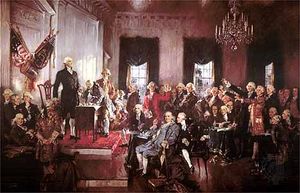 While every real crisis in American history is based in economics, the existential threat behind it remains the same.
While every real crisis in American history is based in economics, the existential threat behind it remains the same.
That threat is to democracy.
Democracy matters for the same reason capitalism matters, and for the same reason liberty matters. Democracy gives a society flexibility. In times of rapid change, and all times are times of rapid change, flexibility matters a lot.
Flexibility means you can adjust to change. And flexibility always comes from the bottom-up, never the top-down. Incumbent leaders either have a set direction that has always worked for them, or demand a set direction whether it is working or not. They want to stay on top, and that desire will always trump the need for change.
Democracy changes leaders. Capitalism brings change to the mix of products and services offered for sale. Liberty delivers new ideas and concepts to the market, to society, and eventually to leaders.
What drives democracy under is tribalism. When people are aligned by tribe, they stop responding to signals for change that are all around them. They follow their tribal leaders instead.
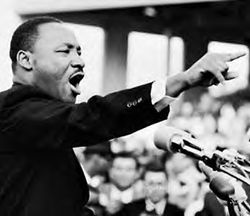
There are also economic tribes. For a century, until the 1970s, there were tribes devoted to capital and tribes devoted to labor driving our politics. Progress, the idea of change, usually lay with capital. This made the Republican Party our more liberal party, through most of the period. Even into the 1960s Big Business, which needed big changes to drive ever-larger profits, was mostly in favor of change, and this delivered a succession of leaders like Wendell Willkie, Thomas E. Dewey, Dwight Eisenhower and Nelson Rockefeller to positions of power.
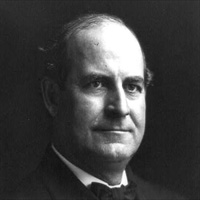
It was the alignment of finance with the key late 19th century goal of regulating monopoly that drove the farm bloc under. Bankers like J.P. Morgan and manufacturers like Henry Ford needed regular input prices in order to scale their operations at a profit. Regulation of markets gave this to them. The movement began in Ohio, with people like John Sherman, continued under McKinley and Teddy Roosevelt, and culminated in a legal and bureaucratic framework that stood for stability, for safety, and for growth.
The manipulation of ethnic blocks was another form of tribalism, which began with the great immigrant waves of the early 19th century. New entrants aligned with Democratic machines, those in the second and third generations aligned with Republican ones. The idea of “Know Nothingism” was that native-born Americans were a tribe, a tribe under threat, and thus only issues which addressed that tribe mattered.
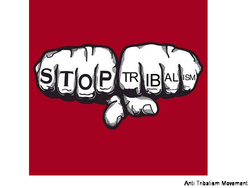
All the issues people talk about only operate on a minority of the people, either those who are moving between tribes or those who, for one reason or another, come to think of themselves as above tribe. For most of the last century those numbers had been rising, and voters were willing to listen to one side or the other in political debates, then vote what they liked to call their conscience.

What made our politics so tribal was the Nixon Thesis of Conflict. Strategists who put the Nixon and Wallace coalitions together, in order to dominate Washington through the last generation, ruled through a strategy of creating enemies. You didn’t vote for the Republicans, you voted against the people, movements and ideas identified by the Republicans with Democrats. The knees jerked, and the jerking could not be argued against.

But that change can’t be validated if people vote strictly according to their tribal loyalties. Not until numbers within the tribes change substantially. That’s our political situation today, entering the 2014 election. Adherents of the Nixon Thesis are working to prevent the change that demographics have already wrought.
The great enemy in this case isn’t the Koch-fed oil man screaming that climate change is a fraud. The great enemy isn’t the preacher trying to control your town’s education budget, nor is it his wife, trying to force your daughter to bear children against her will. The great enemy isn’t the politician who fears the black man, or the brown man, the Asian man or the Indian.
The great enemy is the person who says it doesn’t matter. Anyone who tells you that they’re all crooks, that it’s all a game without end, that there is no sense registering to vote or in voting, they’re the great threat of our time, and they have been America’s enemy for all time.
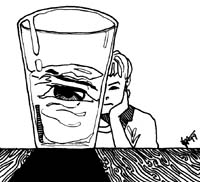
They’re against democracy. They’re against flexibility. They’re against the very process that enables change. They’re against liberty and, ultimately, against the market. They’re anti-American, no matter what they claim their motives are, no matter how sincere they pretend to be, no matter what facts they claim to marshal in defense of their cynical thesis.
Your responsibility, as a citizen, is to think and to participate in the system people have died building for over 200 years. That means participating in the market, as a buyer and a seller. It means speaking your mind, and not letting anyone else’s sensibilities stop you from it. And it means listening to both sides, in every election, and doing your civic duty. Make certain you’re registered, be certain to vote, in every election – for federal office, for state office, for school board and dogcatcher.
Don’t be part of a tribe. Drive change yourself. And ignore all those who tell you that you can’t. Because yes, you can. You always had the power. Your forefathers gave it to you.
They made America for you.


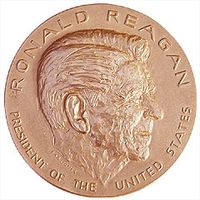








Essay after essay is thoughtful and well planned; is directed toward our improvement and understanding. Thank you.
Essay after essay is thoughtful and well planned; is directed toward our improvement and understanding. Thank you.